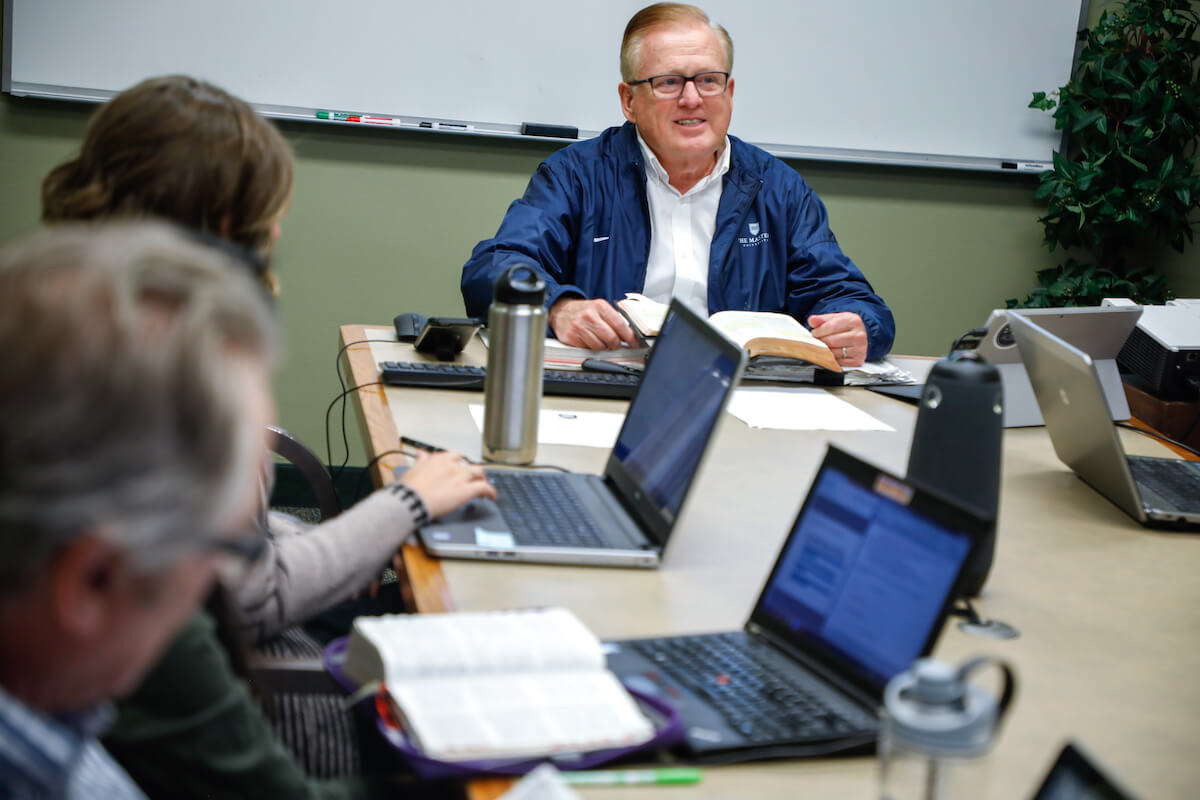
Program Outline
The M.A. in Biblical Counseling (MABC) is a 34-credit-hour graduate degree program, designed to allow students to pursue and receive in-depth training in biblical counseling.
Program Description
The Master of Arts in Biblical Counseling program requires all students to attend at least half their classes in-person to ensure the highest quality of instruction and interaction and meet our accreditation standards. Traditional students may attend classes on campus during the traditional spring and fall semesters. Distance students may attend classes during summer semesters as part of the Summer Institute Program (SIP). The SIP option is open to traditional students as well. SIP or summer classes start at the beginning of the summer semester in May, extend for 16-weeks as normal, and conclude at the end of the summer semester in August. Students complete coursework for SIP classes throughout the semester remotely, turn in their work online and attend in person one week of lectures for each class on campus during the second or third week of July. These condensed or intensive lectures allow students living far away to attend classes in-person and satisfy the lecture requirement for the program. To receive credit for SIP classes, students must successfully complete all the assigned coursework beginning in May and ending in August, and attend in person all the class lectures for one week in July. Due to the intensive nature of the lecture component, students must attend every lecture and missing one lecture will result in them not passing the class and being be required to retake it.
Program Length
The program can be completed in two to four years, but the length of time a student takes to complete it may depend on the student’s own schedule and external commitments, as well as course offerings that are dependent on minimum enrollment, instructor availability, and the program’s semester schedule. Typically, students complete their coursework over a two to three year period and complete their internship and research in one additional year. Please see the policies below that relate to program limits, student status, graduation, etc. as they provide important information about expectations for student performance and implications for non-compliance, as well as applicable fees and guidelines.
Program Requirements
The MABC degree is awarded to students who successfully fulfill the requirements of 16 core courses and 1 elective course (17 classes, 34 units).
Required Courses
- BC501: Introduction to Biblical Counseling (2)
- BC502: Essential Qualities of a Biblical Counselor (2)
- BC503: Methods of Biblical Change (2)
- BC506: Theology & the Psychologies (2)
- BC511: Theological Basis of Counseling (2)
- BC521: Problems & Procedures (2)
- BC531: Hermeneutics (2)
- BC532: Advanced Hermeneutics (2)
- BC542: Marriage & Family Counseling (2)
- BC556: ACBC Membership Seminar (2)
- BC557: Counseling & Physiology (2)
- BC560: Biblical Conflict Reconciliation (2)
- BC580: Counseling Observation and Practicum (2)
- BC592: Applied Soul Care I (2)
- BC593: Applied Soul Care II (2)
- BC598: Thesis Research (2)
One Elective Course
The student will take one additional elective course (2 credit hours), related to his or her specific research or counseling methodology interests. Elective class offerings vary from semester to semester. For a list of some of the elective classes we have offered, please consult our Class Listings page.
*Every student graduating from the MABC program will have completed all requirements for certification with the Association of Certified Biblical Counselors (ACBC), by nature of those requirements seamlessly woven into the curriculum of required courses.
Program Formats
Both program formats have the same cost, curriculum, professors, and program length (2 years minimum and 6 years maximum).
On-Campus (For Local Students)

Fall/Spring Semesters (Aug - Dec, Jan - May)
- Semester length: 16 weeks.
- Class Assignments: Online assignments from home
- Class days: Once a week on either a Monday, Tuesday, Wednesday, or Thursday
- Class times: 5:30pm - 7:20pm or 7:30pm - 9:20pm
- Attendance: Required in-person
- Optional: Students can take some online courses with advisor approval
Summer Semesters (May - Aug)
Optional: Summer semesters are optional (not recommended) for On-campus students. Follow the Distance/Hybrid Summer format and schedule.
Distance/Hybrid (For Non-Local Students)

Fall/Spring Semesters (Aug - Dec, Jan - May)
- Semester length: 16 weeks.
- Class Assignments: Online assignments from home
- Class days: None
- Class times: None. These are online pre-recorded class lectures
- Attendance: No in-person attendance required, except … BC598 requires one-day in-person attendance the day before graduation to defend thesis
- Optional: “Live” interactive online lectures. Follow the Fall/Spring On-Campus class format and schedule. Attendance required from your computer at home.
Summer Semesters (May - Aug) required for all distance/hybrid students
- Semester length: 16 weeks (1 week lectures in July; 2 weeks max.)
- Class Assignments: Online assignments from home
- Class days: Monday – Friday (1 week min. for each class; max. 2 classes a week)
- Class times: 8:30am – 12:25pm or 1:45pm – 5:40pm
- Attendance: Required in-person attendance for class lectures in July for 1 week min., 2 weeks max. (July dates vary year to year)
- Optional: On-campus housing/meals available at $495/week/person
Thesis Symposium / Composition
Each student is required to develop a 20-to-30-page thesis research outline as a capstone project and give a defense of their research in person on the university campus at the time of annual graduation proceedings at the beginning of May. The symposium highlights the project and allows others to benefit from the students’ efforts in research. The defense will be given to a panel of faculty and staff of the MABC program and will be open for others to observe. An option exists for students to write a 120-page thesis composition in lieu of the thesis research project. Each project is represented by a separate course. Students must receive advisor approval prior to enrolling in the thesis composition course. Students may be advised to complete the thesis research course first and upon successful completion may then be approved to continue developing their work into a thesis composition. Most students will complete the thesis research course.